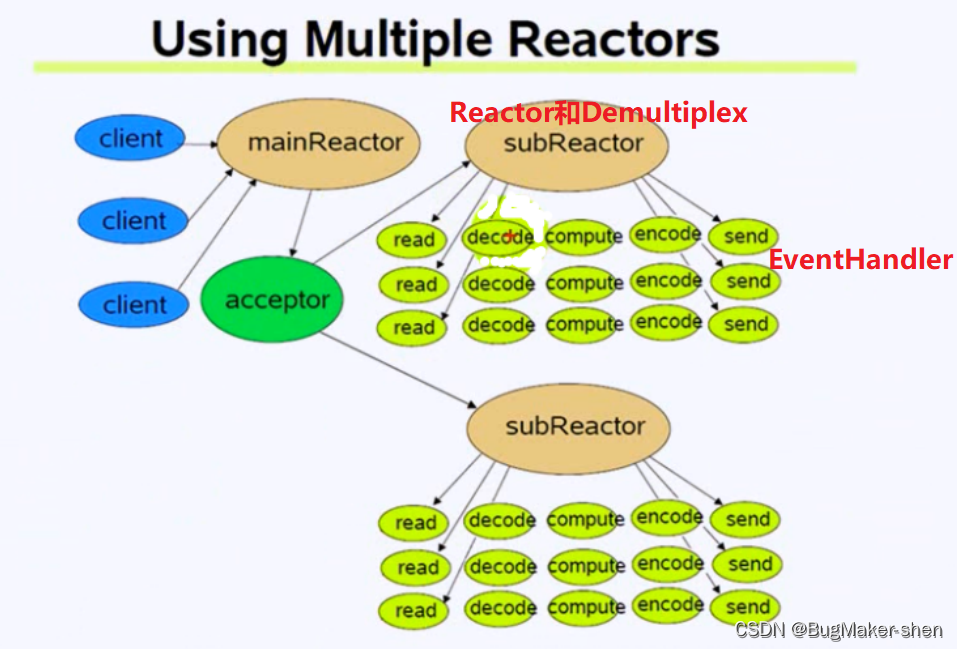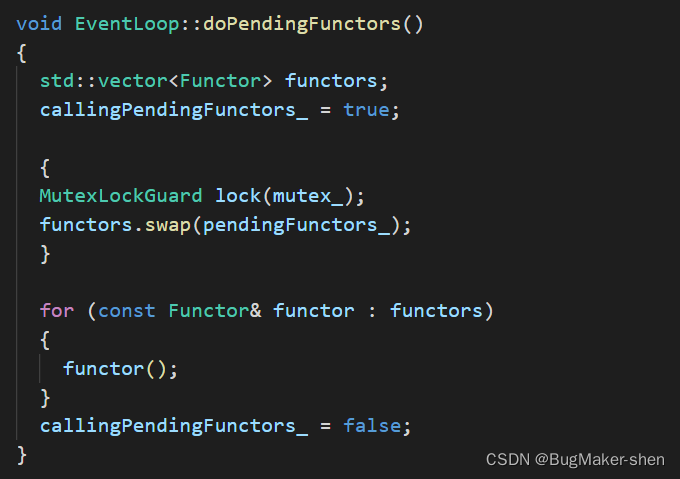文章目录
一、EventLoop.h

如果我们设置了多线程的Reactor反应堆类型,mainReactor处理新用户的连接,accept,拿到新用户通信的fd,把fd感兴趣的事件打包成Channel,然后唤醒某个工作线程subReactor,即Eventloop。每个工作线程subReactor都监听一组Channel,每一组Channel都在自己所属的Eventloop获取发生的事件以及相应的回调操作
如果没有事件发生的话,mainReactor和subReactor所处的线程都是阻塞睡眠的,如果现在mainReactor监听到一个新用户的连接,得到了表示新用户连接的fd,以及感兴趣的事件的Channel,mainReactor如何把这个Channel给subReactor呢?
统一事件源的原理
在libevent库中,采用的是socketpair,使用的是网络通信机制,效率不如eventfd

这就是线程间的通信机制,创建了一个eventfd,调用eventfd方法可以直接在内核空间notify用户空间的应用程序,让应用程序该线程起来做事情,效率高

重写EventLoop.h
#pragma once
#include "noncopyable.h"
#include "Timestamp.h"
#include "CurrentThread.h"
#include <functional>
#include <vector>
#include <atomic>
#include <memory>
#include <mutex>
class Channel;
class Poller;
/**
* 事件循环类:主要包含两个大模块 Channel(包含了监听的sockfd,感兴趣的事件和发生的事件) Poller(epoll的抽象)
*/
class EventLoop : noncopyable{
public:
using Functor = std::function<void()>;
EventLoop();
~EventLoop();
void loop(); // 开启事件循环
void quit(); // 退出事件循环
Timestamp pollReturnTime() const { return pollReturnTime_; }
void runInLoop(Functor cb); // 在当前loop中执行回调cb
void queueInLoop(Functor cb); // 把cb放到队列中,等到loop所在线程被唤醒后再执行cb
void wakeup(); // 用于唤醒loop所在线程
void updateChannel(Channel* channel); // Channel调用所在loop的updateChannel来epoll_ctl EPOLL_CTL_ADD EPOLL_CTL_MOD
void removeChannel(Channel* channel); // Channel调用所在loop的removeChannel来epoll_ctl EPOLL_CTL_DEL
bool hasChannel(Channel* channel); // 查看当前循环是否有管理参数传入的channel
bool isInLoopThread() const {
// threadId_是loop所在线程缓存的tid,CurrentThread::tid()返回的是执行线程的tid
// 如果不相等,那得等到当前loop所属线程被唤醒的时候,才能执行loop相关的回调操作
return threadId_ == CurrentThread::tid();
}
private:
void handleRead(); // 主要用于wakeup
void doPendingFunctors(); // 执行回调。回调都在vector pendingFunctors_里面
using ChannelList = std::vector<Channel*>;
std::atomic_bool looping_; // 是否正常事件循环,原子操作,通过CAS实现
std::atomic_bool quit_; // 退出loop循环的标志
const pid_t threadId_; // 记录创建EventLoop对象的线程tid,会用于和执行的线程id比较,就可以判断这个Eventloop对象在不在当前线程里
Timestamp pollReturnTime_; // 记录Poller返回发生事件的Channels的时间,有事件发生后,Poller会返回所有有事件发生的Channel
std::unique_ptr<Poller> poller_; // EventLoop对象管理的唯一的poller
int wakeupFd_; // eventfd()创建的,作用是当mainLoop获取一个新用户的Channel,通过轮询算法选择一个subLoop,通过wakeupFd_唤醒subLoop处理事件,每一个subReactor都监听了wakeupFd_
std::unique_ptr<Channel> wakeupChannel_; // 用于封装wakeupFd_
ChannelList activateChannels_; // EventLoop管理的所有channel
Channel* currentActiveChannel_;
std::atomic_bool callingPendingFunctors_; // 标识当前loop是否有需要执行的回调操作
std::vector<Functor> pendingFunctors_; // 存放loop具体处理事件的回调操作
std::mutex mutex_; // 用于保护pendingFunctors_的线程安全
};
二、createEventfd
// 创建wakeupfd,用来notify唤醒subReactor,然后处理新的Channel
int createEventfd(){
int evtfd = ::eventfd(0, EFD_NONBLOCK | EFD_CLOEXEC);
if (evtfd < 0){
// eventfd失败,会导致事件发生后无法通知subReactor(Ev entLoop)处理事件
LOG_FATAL("Failed in eventfd! errno : %d\n", errno);
}
return evtfd;
}
三、EventLoop::EventLoop
EventLoop::EventLoop()
: looping_(false)
, quit_(false)
, callingPendingFunctors_(false)
, threadId_(CurrentThread::tid())
, poller_(Poller::newDefaultPoller(this))
, wakeupFd_(createEventfd())
, wakeupChannel_(new Channel(this, wakeupFd_))
{
LOG_DEBUG("EventLoop created %p in thread %d \n". this, threadId_);
if(t_loopInThisThread != nullptr){
LOG_FATAL("There has existed an EventLoop %p in this thread %d \n", this, threadId_);
}else{
// 当前线程第一次创建EventLoop对象
t_loopInThisThread = this;
}
// 设置wakeupFd_的事件类型以及发生事件后的回调操作
// EventLoop::handleRead方法只有一个参数,是EventLoop对象,由于我们传入了this,bind返回的是一个function<void()>的对象
// 这里有一个疑问,function<void()>对象作为实参,传递给setReadCallBack形参ReadEventCallBack function<void(Timestamp)> ???
wakeupChannel_->setReadCallBack(std::bind(&EventLoop::handleRead, this));
// 每一个EventLoop都将监听wakeupChannel_的读事件,kReadEvent = EPOLLIN | EPOLLPRI
wakeupChannel_->enableReading();
}
四、EventLoop::handleRead和EventLoop::wakeup
当有新的客户端连接时,mainReactor会发送8字节的数据到wakeupFd_,发送的内容不重要,重要的是subReactor会监听wakeupFd_,一旦wakeupFd_有事件发生,subReactor就会被唤醒,subReactor被唤醒后就能拿到新用户到来的Channel
void EventLoop::handleRead(){
uint64_t one = 1;
ssize_t n = read(wakeupFd_, &one, sizeof(one));
if(n != sizeof(one)){
LOG_ERROR("EventLoop::handleRead() reads %d bytes instead of 8 \n", n);
}
}
wakeup方法是给其他loop所在线程执行的,用于唤醒loop所在线程,向该loop的wakeupFd_写数据即可
void EventLoop::wakeup(){
uint64_t one = 1;
ssize_t n = write(wakeupFd_, &one, sizeof(one));
if(n != sizeof(one)){
// 真正写入的数据大小n并不是我们想写的sizeof(one)
LOG_ERROR("EventLoop::wakeup() writes %lu bytes instead of 8 \n", n);
}
}
五、EventLoop::loop和EventLoop::doPendingFunctors
执行当前EventLoop事件循环需要处理的回调操作?
对于IO线程mainReactor主要是accept,主要用于等待新用户的到来,新连接建立后我们会用Channel封装fd然后分发给subReactor,而mainReactor只负责监听新用户的连接
mainReactor会事先注册回调函数,回调函数需要subReactor执行
// 开启事件循环
void EventLoop::loop(){
looping_ = true;
quit_ = false;
LOG_INFO("EventLoop %p start looping \n", this);
while(!quit_){
activateChannels_.clear();
// 当epoll_wait发生事件以后,poller会把发生事件的channel写入EventLoop的成员变量activateChannels_
// 然后EventLoop就会调用发生事件Channel的回调函数
// 监听两类回调函数:client fd和wakeupfd(用于mainReactor和subReactor通信)
pollReturnTime_ = poller_->poll(kPollTimeMs, &activateChannels_);
// for循环处理所有发生事件的channel
for(Channel* channel : activateChannels_){
// poller监听哪些channel发生事件,然后上报给EventLoop,EventLoop通知channel调用相应的回调函数处理相应的事件(Channel执行回调)
channel->handleEvent(pollReturnTime_);
}
// subReactor被唤醒后,执行需要处理的回调操作(mainReactor事先注册的),接收新用户的Channel
doPendingFunctors();
}
LOG_INFO("EventLoop %p stop loop \n", this);
looping_ = false;
}
EventLoop::doPendingFunctors源码:

doPendingFunctors执行回调的时候我们看到,它首先定义了一个局部的vector,然后把1个变量置为true
接着加了一把锁,执行swap,把放在pendingFunctors_里面的所有待执行的回调全部放到局部的vector里面,而pendingFunctors_就被置空了
因为doPendingFunctors这个函数要把pendingFunctors_里面的所有待执行的回调全部执行完并清空,再给其他线程继续添加回调函数。由于操作pendingFunctors_容器进行线程安全的加锁控制,如果让函数变边执行边删除容器元素,pendingFunctors_容器就会一直被锁住,导致其他线程无法读写,即可能使得mainReactor无法对pendingFunctors_容器写入channel下发给subReactor,造成服务器的时延变长
使用swap,就能解决pendingFunctors_一直被加锁的问题
重写doPendingFunctors
void EventLoop::doPendingFunctors(){
std::vector<Functor> functors;
callingPendingFunctors_ = true;
{
// 操作pendingFunctors_容器需要加锁控制,否则可能出现回调函数对象被覆盖等线程安全问题
std::unique_lock<std::mutex> lock(mutex_);
functors.swap(pendingFunctors_);
}
for(const Functor& functor : functors){
functor(); // 执行当前loop需要执行的回调函数
}
callingPendingFunctors_ = false;
}
六、EventLoop::quit
退出事件循环分两种情况:EventLoop所属线程调用quit、非EventLoop所属线程调用quit
这两种情况都是允许发生的
void EventLoop::quit(){
// 把EventLoop的quit_置为true,表示要停止当前loop,EventLoop所属线程在loop函数中退出while循环
quit_ = true;
if(!isInLoopThread()){
// 当前执行线程并不是EventLoop所属线程,则通过eventFd唤醒EventLoop所属线程,让其停止阻塞继续执行,接着就退出while循环
// 如果EventLoop所属线程阻塞了,不进行唤醒的话,就算把quit_置为true,EventLoop所属线程也不会立刻退出,因为无法立即执行while的判断语句
wakeup();
}
}
情况一则是正常停止,若是情况二,当前执行线程并不是EventLoop所属线程,则通过eventFd唤醒EventLoop所属线程,让其停止阻塞继续执行,接着就退出while循环
如果EventLoop所属线程阻塞了,不进行唤醒的话,就算把quit_置为true,EventLoop所属线程也不会立刻退出,因为无法立即执行while的判断语句
七、EventLoop::runInLoop和EventLoop::queueInLoop
// 在当前loop中执行回调cb
void EventLoop::runInLoop(Functor cb){
if(isInLoopThread()){
cb(); // 在当前loop线程中
}else{
queueInLoop(cb);
}
}
// queueInLoop是给非EventLoop所在线程执行的,把cb放到队列中,等到loop所在线程被唤醒后再执行cb
void EventLoop::queueInLoop(Functor cb){
{
std::unique_lock<std::mutex> lock(mutex_);
pendingFunctors_.emplace_back(cb); // emplace_back是直接构造,push_back是拷贝构造
}
// 执行线程并非loop所在线程 || loop所在线程正在执行回调函数,但是loop又有了新的回调
// loop执行完回调函数后会重新阻塞,所以需要唤醒,继续执行新来的回调
if(!isInLoopThread() || callingPendingFunctors_){
wakeup(); // 唤醒相应需要执行pendingFunctors_内回调操作的线程
}
}
八、完整代码
#include "EventLoop.h"
#include "Logger.h"
#include "Poller.h"
#include "Channel.h"
#include <sys/eventfd.h>
#include <unistd.h>
#include <fcntl.h>
#include <errno.h>
#include <functional>
#include <memory>
/**
* t_loopInThisThread是全局的EventLoop类型的指针变量,指向当前线程中的EventLoop对象,
* t_loopInThisThread为nullptr时才会创建EventLoop对象,防止一个线程创建多个EventLoop
* __thread就是thread_local,每个线程会拷贝一份该全局变量在自己的线程空间,每个线程一份
*/
__thread EventLoop* t_loopInThisThread = nullptr;
// 定义默认Poller IO复用接口的超时事件
const int kPollTimeMs = 10000;
// 创建wakefd,用来notify唤醒subReactor,然后处理新的Channel
int createEventfd(){
int evtfd = ::eventfd(0, EFD_NONBLOCK | EFD_CLOEXEC);
if (evtfd < 0){
// eventfd失败,会导致事件发生后无法通知subReactor(Ev entLoop)处理事件
LOG_FATAL("Failed in eventfd! errno : %d\n", errno);
}
return evtfd;
}
EventLoop::EventLoop()
: looping_(false)
, quit_(false)
, callingPendingFunctors_(false)
, threadId_(CurrentThread::tid())
, poller_(Poller::newDefaultPoller(this))
, wakeupFd_(createEventfd())
, wakeupChannel_(new Channel(this, wakeupFd_))
{
LOG_DEBUG("EventLoop created %p in thread %d \n". this, threadId_);
if(t_loopInThisThread != nullptr){
LOG_FATAL("There has existed an EventLoop %p in this thread %d \n", this, threadId_);
}else{
// 当前线程第一次创建EventLoop对象
t_loopInThisThread = this;
}
// 设置wakeupFd_的事件类型以及发生事件后的回调操作
// EventLoop::handleRead方法只有一个参数,是EventLoop对象,由于我们传入了this,bind返回的是一个function<void()>的对象
// 这里有一个疑问,function<void()>对象作为实参,传递给setReadCallBack形参ReadEventCallBack function<void(Timestamp)> ???
wakeupChannel_->setReadCallBack(std::bind(&EventLoop::handleRead, this));
// 每一个EventLoop都将监听wakeupChannel_的读事件,kReadEvent = EPOLLIN | EPOLLPRI
wakeupChannel_->enableReading();
}
EventLoop::~EventLoop(){
wakeupChannel_->disableAll(); // 所有事件都不感兴趣
wakeupChannel_->remove(); //
::close(wakeupChannel_->fd()); // 关闭fd
t_loopInThisThread = nullptr; // 指向线程中EventLoop对象的指针置空
}
// 开启事件循环
void EventLoop::loop(){
looping_ = true;
quit_ = false;
LOG_INFO("EventLoop %p start looping \n", this);
while(!quit_){
activateChannels_.clear();
// 当epoll_wait发生事件以后,poller会把发生事件的channel写入EventLoop的成员变量activateChannels_
// 然后EventLoop就会调用发生事件Channel的回调函数
// 监听两类回调函数:client fd和wakeupfd(用于mainReactor和subReactor通信)
pollReturnTime_ = poller_->poll(kPollTimeMs, &activateChannels_);
// for循环处理所有发生事件的channel
for(Channel* channel : activateChannels_){
// poller监听哪些channel发生事件,然后上报给EventLoop,EventLoop通知channel调用相应的回调函数处理相应的事件(Channel执行回调)
channel->handleEvent(pollReturnTime_);
}
// subReactor给唤醒后,执行需要处理的回调操作(mainReactor事先注册的),接收新用户的Channel
doPendingFunctors();
}
LOG_INFO("EventLoop %p stop loop \n", this);
looping_ = false;
}
// 退出事件循环
// 分两种情况:1.EventLoop所属线程调用quit 2.非EventLoop所属线程调用quit,这两种情况都是允许发生的
void EventLoop::quit(){
// 把EventLoop的quit_置为true,表示要停止当前loop,EventLoop所属线程在loop函数中退出while循环
quit_ = true;
if(!isInLoopThread()){
// 当前执行线程并不是EventLoop所属线程,则通过eventFd唤醒EventLoop所属线程,让其停止阻塞继续执行,接着就退出while循环
// 如果EventLoop所属线程阻塞了,不进行唤醒的话,就算把quit_置为true,EventLoop所属线程也不会立刻退出,因为无法立即执行while的判断语句
wakeup();
}
}
// 在当前loop中执行回调cb
void EventLoop::runInLoop(Functor cb){
if(isInLoopThread()){
cb(); // 在当前loop线程中
}else{
queueInLoop(cb);
}
}
// 把cb放到队列中,等到loop所在线程被唤醒后再执行cb
void EventLoop::queueInLoop(Functor cb){
{
std::unique_lock<std::mutex> lock(mutex_);
pendingFunctors_.emplace_back(cb); // emplace_back是直接构造,push_back是拷贝构造
}
// 执行线程并非loop所在线程 || loop所在线程正在执行回调函数,但是loop又有了新的回调
// loop执行完回调函数后会重新阻塞,所以需要唤醒,继续执行新来的回调
if(!isInLoopThread() || callingPendingFunctors_){
wakeup(); // 唤醒loop所在线程
}
}
// wakeup方法是给其他loop所在线程执行的,用于唤醒loop所在线程,向该loop的wakeupFd_写数据即可,
void EventLoop::wakeup(){
uint64_t one = 1;
ssize_t n = write(wakeupFd_, &one, sizeof(one));
if(n != sizeof(one)){
// 真正写入的数据大小n并不是我们想写的sizeof(one)
LOG_ERROR("EventLoop::wakeup() writes %lu bytes instead of 8 \n", n);
}
}
// Channel调用所在loop的updateChannel来epoll_ctl EPOLL_CTL_ADD EPOLL_CTL_MOD,修改Poller
void EventLoop::updateChannel(Channel* channel){
poller_->updateChannel(channel);
}
// Channel调用所在loop的removeChannel来epoll_ctl EPOLL_CTL_DEL
void EventLoop::removeChannel(Channel* channel){
poller_->removeChannel(channel);
}
// 查看当前循环是否有管理参数传入的channel
bool EventLoop::hasChannel(Channel* channel){
poller_->hasChannel(channel);
}
/**
* 当有新的客户端连接时,mainReactor会发送8字节的数据到wakeupFd_,
* 发送的内容不重要,重要的是subReactor会监听wakeupFd_,一旦wakeupFd_有事件发生,subReactor就会被唤醒,
* subReactor被唤醒后就能拿到新用户到来的Channel
*/
void EventLoop::handleRead(){
uint64_t one = 1;
ssize_t n = read(wakeupFd_, &one, sizeof(one));
if(n != sizeof(one)){
LOG_ERROR("EventLoop::handleRead() reads %d bytes instead of 8 \n", n);
}
}
// 执行回调。回调都在vector pendingFunctors_里面
void EventLoop::doPendingFunctors(){
std::vector<Functor> functors;
callingPendingFunctors_ = true;
{
std::unique_lock<std::mutex> lock(mutex_);
functors.swap(pendingFunctors_);
}
for(const Functor& functor : functors){
functor(); // 执行当前loop需要执行的回调函数
}
callingPendingFunctors_ = false;
}
